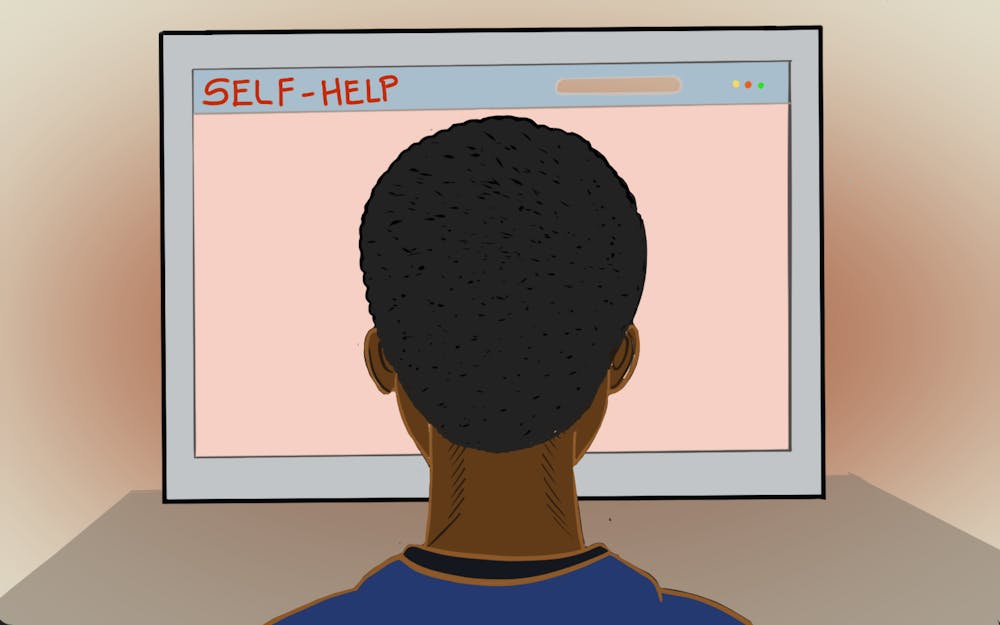In a 2019 debate with Canadian clinical psychologist and conservative commentator Jordan Peterson, Slavoj Žižek, a Slovenian philosopher, asked him a question about his universal suggestion of “setting your house in perfect order before criticizing the world” as a starting point in one’s self-help journey. Peterson, in his book, “12 Rules for Life,” talks about this in detail where he suggests that individuals should focus on what they can influence directly, rather than worrying about things outside their control.
Žižek questions this suggestion by proposing the scenario where, in the process of “setting their house in order,” one finds out that their house is in disorder because of the social reality they are in. He builds on this by joking how absurd it would be to tell someone from North Korea to get their house in order to solve their problems. With this, he points out the most fundamental problem with the self-help industry — its focus on the individual.
The self-help industry revolves around the idea of individual responsibility. However, this responsibility is tainted by a paradox. It burdens individuals by giving them a false sense of control to counter systemic issues. In the self-help paradigm, an individual counters systemic issues by becoming an exception to them. Success is not guaranteed with this belief, but one can develop an understanding of the world through self-help, which can be explained by examining the economic system one finds themself in.
Capitalism enforces itself in all aspects of the human experience. This is a result of ideological obedience: essentially, the constant feeding of the capitalist narrative since birth leads to its internalization. In Marxist theory, the social system is structured with a capitalist economic base that produces a “superstructure,” and the two maintain a symbiotic relationship with each other. The economic base includes the means of production, and everything directly related to it. This economic base shapes the superstructure, which encompasses everything not directly related to economic production, like art, family, culture and education. The online self-help industry is one aspect of the superstructure.
For an individual within the capitalist system, their primary perception of control stems from their personal agency. But focusing all their energy on that breeds arrogance and ignorance of their social reality — an understanding of class and struggles associated with the rampant inequality pervading today’s society.
Self-help content thrives on isolation, empowering people with a false semblance of control. This leads the individual toward an action plan of perceived personal success. It is a very convenient system where those who don’t succeed because of larger systemic issues are told they are simply not working as hard as those who have succeeded. However, directing someone toward an action plan is not an easy task, as it must be convincing enough for them to leave their instinct to collectivize for an individualized lifestyle.
One naturally exists in a social setting and responds to their material conditions. Self-help content succeeds by giving people a false understanding of their social setting. An individual as a concept is then produced in the paradigm of self-help through this false understanding of the social world that one must accept.
The individual is further reinforced by the creation of cultural objects like the “self-made” man, which gained popularity through the narrative of the American Dream. A “self-made” man is celebrated as achieving success solely through hard work and personal merit embodying the belief that anyone, regardless of their socio-economic background, can attain success through sheer determination. Such an ideal serves as an aspiration for individuals, thereby fostering a system of complete subservience.
The myth of meritocracy is legitimized, wherein success is determined by individual abilities and hard work, rather than by factors such as social class, family background or systemic inequalities, leading to the formation of a population ignorant to privilege and inequality. This ignorance stems from a view of justifying inequality as a necessary incentive to maintain this false idea of meritocracy.
From this, a monotonous life of a struggle like that of Sisyphus is born. Sisyphus, a king in Greek mythology, was condemned by the gods to roll a boulder up a hill, only for it to roll back down every time he neared the top, thus forcing him to repeat the task for eternity. The myth represents the repetitive and futile nature of human existence in capitalism. For an individual, the struggle is being stuck in a loop of labor and consumption, where one tries to find fulfillment in consumption through the pursuit of material success but never really finds complete fulfillment. Their efforts to pursue a meaningful life prove futile and, ultimately, lead to maintaining the status quo.
When one has completely internalized the individualized framework of life, they are forced to resign from life itself for a life under capitalism. Their resignation marks a life that helps maintain the economic base, subsequently contributing to the capitalist economy. The winner and go-getter mentality that self-help promotes paradoxically represents a loss for most people.
It is imperative that, irrespective of the economic condition that one finds oneself in, one must develop an understanding of their social reality. This can happen through developing a critical mindset toward themselves and their surroundings, and it can lead to developing a way to circumvent the internalization of a false sense of control.
Advait (he/they) is a sophomore studying economics and sociology.






